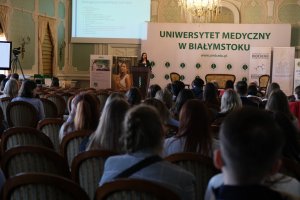On 26 April 2024, the Second International Conference of Young Scientists 'Biomarkers of Civilisation Diseases' was held in the Aula Magna of the Branicki Palace.
Diseases of civilisation are among the biggest health problems in the world today. They are estimated to cause more than 80% of all deaths, both in developed and developing countries. A key role in the fight against civilisation diseases is played by prevention and screening tests that allow early diagnosis of the disease and implementation of appropriate treatment. It is believed that the development of new diagnostic markers may allow more effective treatment of many diseases. As defined by the National Institute of Health, a biomarker is "a characteristic that can be objectively measured and can be used in the assessment of physiological biological processes, pathological processes or the body's response to therapeutic interventions". With the development of analytical techniques, the importance of biomarkers in medicine continues to grow.
The Conference was organised by the Department of Hygiene, Epidemiology and Ergonomics of the MUB, the Polish Hygiene Society Bialystok Branch and the Student Scientific Circle "Biochemistry of Civilisation Diseases".
The Organising Committee received more than 400 applications from participants from Poland and abroad, including the UK, Georgia, Turkey, Bulgaria, Iran and India. The young scientists had the opportunity to listen to a series of interdisciplinary lectures delivered by specialists in medical and health sciences. In addition, they were given the chance to present the results of their own research, which were evaluated by a jury of experts in the field of civilisation diseases. Sixteen conference reports were presented in oral presentations, while 158 posters were presented during the poster session. The best presentations were awarded by the Scientific Committee in a competition.
Three places were awarded in the oral session:
- 1st place: Tomasz Jamiołkowski “The influence of impaired glucose metabolism on inflammatory mediators’ response to glucose loading”
- 2nd place: Maryia Zhorakh "Immunohistochemical analysis of the expression of septin 6 in correlation with clinicopathological parameters in gastric cancer”
- 3rd place: Eshan Zamani “A survey of protective effect of melatonin against trifluoperazine - induced genotoxicity in peripheral blood lymphocytes via micronucleus assay”
and three equal distinctions:
- Weronika Woldańska “Sulfatide (SM4) serves as a regulatory molecule crucial in the transcription of BOLA2 gene”
- Virginia Ewa Lis "Assessment of the stimulated saliva lipid panel in children with controlled type 1 diabetes”
- Zuzanna Zielińska “Analysis of the levels of proteasome, immunoproteasome, cathepsin S and L - potential biomarkers of endometriosis using SPRi biosensors”
Three places were awarded in the poster session:
- 1st place: Katarzyna Giedzicz “Neutrophil-to-lymphocyte ratio (NLR), platelet-to-lymphocyte ratio (PLR), and vitamin B12 level in the geriatric population”
- 2nd place: Filip Targosiński "Lipopolysaccharide animal model as a base for future research targeting the problem of Alzheimer’s disease”
- 3rd place: Oleksandra Roshchuk “Pro-oxidant–antioxidant balance in the patients with periodontal disease and concomitant peptic ulcer with existing fixed dentures”
and three equal distinctions:
- Natalia Dorf “Protein glycoxidation products in the skin tissue of rats with streptozotocin-induced diabetes mellitus”
- Natalia Świsłocka “Immunohistochemical expression of Tensin-4 in pancreatic ductal cancer in correlation with selected clinicopathological parameters”
- Jakub Kopczyński “Advanced oxidation protein products in the serum of COVID-19 patients”.
A wide range of certified practical workshops on flow cytometry, immunohistochemistry, next-generation sequencing (NGS), computerised skin analysis or knowledge commercialisation also awaited Conference participants. The educational part of the Conference was very successful.
The aim of the Conference was to present internationally the latest knowledge on biomarkers used in the prevention, diagnosis and treatment of diseases of civilisation. Biological markers serve as a specific determinant of the "disease-exposure" sequence of events, thanks to which they are used not only in the diagnosis of pathological conditions, and their importance in modern medicine is enormous.
The event was held under the honorary patronage of Rector of the Medical University of Bialystok, the Dean of the Faculty of Health Sciences at the MUB, the Polish Hygiene Association and the Student Parliament of the Republic of Poland.
The Scientific Committee consisted of:
- dr hab. Mateusz Maciejczyk – President
- prof. dr hab. Robert Bucki
- prof. Barbara Choromańska
- dr hab. Jarosław Daniluk
- dr hab. Justyna Dorf
- prof. dr hab. Karolina Gerreth
- prof. Giuseppe Lo Giudice
- dr Roberto Lo Giudice
- dr hab. Małgorzata Knapp
- prof. dr hab. Joanna Matowicka-Karna
- prof. dr hab. Barbara Mroczko
- prof. dr hab. Piotr Myśliwiec
- dr hab. Małgorzata Rusak
- prof. dr hab. Katarzyna Taranta-Janusz
- dr hab. Ryszard Tomasiuk
- dr hab. Marzena Wątek
- prof. dr hab. Zyta Beata Wojszel
- prof. dr hab. Anna Zalewska
- prof. dr hab. Małgorzata Żendzian-Piotrowska


















